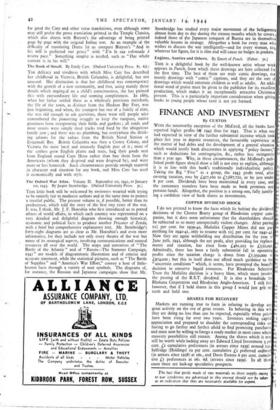The Book of Small. By Emily Carr. (Oxford University Press.
Ss. 6d.)
THE delicacy and vividness with which Miss Carr has described her childhood in Victoria, British Columbia, is delightful, but not unusual. Her distinction is that her childhood was contemporary with the growth of a new community, and that, using mainly those details which imping,:d on a child's consciousness, she has painted this with extraordinary life and seeming completeness. In 1863, when her father settled there as a wholesale provision merchant, the life of the town, as distinct from the Hudson Bay Fort, was just beginning, and when, the youngest but one of a family of nine, she was old enough to ask questions, there were still people who remembered the pioneering struggle to keep the rampant, native greenness from overgrowing their fields and gardens; all roads and most streets were simply mud tracks trod hard by the ubiquitous family cow ; and there was no plumbing, but everywhere the drink- ing saloons for the sailors from the British Naval Station at Esquimalt Bay. British Columbia was then a Crown Colony, and Victoria the most loyal and intensely English part of it ; most of the settlers grew English plants and trees, had their goods sent from England round Cape Horn rather than buy them from the Americans (whom they despised and were despised by), and were more or less homesick. Such circumstances provide enough material in character and situation for any book, and Miss Carr has used it economically and with style.


























 Previous page
Previous page